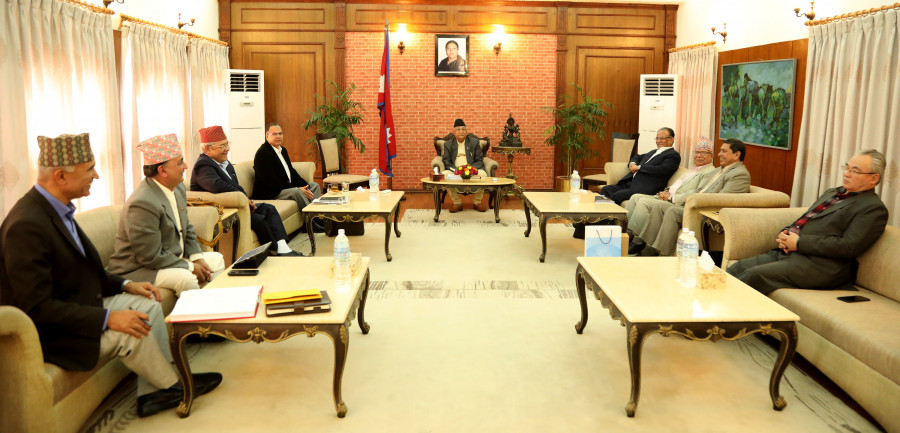Politics
Ruling party’s decision to name Gautam for Upper House against spirit of constitution, say experts
Constitution envisions three National Assembly members nominated by president, but their recommendation needs to be made by the government, not the party.
Binod Ghimire
The Nepal Communist Party has plunged into a crisis after Prime Minister KP Sharma Oli made his position clear against a decision of the party secretariat. Oli, a co-chair of the party, said he preferred Finance Minister Yubraj Khatiwada over Vice-chair Bamdev Gautam to take a seat in the National Assembly.
The nine-member secretariat on Wednesday afternoon decided to replace Khatiwada, whose two-year term in the Upper House ends on March 3, with Gautam.
Based on the constitutional mandate, President Bidya Devi Bhandari, upon the recommendation of the government, on February 21, 2018, nominated three members, including Khatiwada to the Upper House.
When the Parliament Secretariat finalised the tenures of the members of the National Assembly through a lottery, Khatiwada drew a token for a two-year term, Bimala Rai Poudyal and Ram Narayan Bidari, the two other members nominated by Bhandari, received four and six years respectively.
Article 86 of the Constitution of Nepal says that the president shall nominate three Upper House members—at least one of them a woman—upon the recommendation of the Government of Nepal.
Constitutional and political experts say the law of the land made provisions to select three three members of 59-strong Upper House through nomination so that reputed personalities or members of excluded communities find a place in the legislature.
“The nomination provision was meant to ensure the participation of the people who have national recognition,” Krishna Pokharel, a political expert, told the Post. “Our National Assembly is envisioned to be inclusive with the representation of people from different walks of life.”
Though Khatiwada, Rai and Bidari were nominated because of their close ties with the Nepal Communist Party, they were established personalities in their respective sectors.
Experts say the decision to nominate Gautam sets a wrong precedent in two ways. First, appointing someone who was defeated in the elections contradicts the spirit of the constitution and second, it is the government, not the party that should decide who should be nominated.
“It would be a betrayal to the constitution if Gautam is appointed in the Upper House,” Bhimarjun Acharya, a constitution expert, told the Post. “The party choosing a candidate for nomination is an example of how the ruling party has crossed all limits in breaching the spirit of the constitution.”
In the two years following his defeat in Bardiya-1 during elections for the House of Representatives, Gautam has made a handful of attempts at getting a seat in Parliament. In October 2018, the party planned to order Ram Bir Manandhar, a lawmaker from Kathmandu-7, to tender his resignation so that Gautam could take his place. Gautam had even explored other constituencies, such as Dolpa, with similar intention. There were talks of him contesting the November 30 by-election for the Kaski-2 seat in the Lower House that had fallen vacant after the death of then tourism minister Rabindra Adhikari.
Party leaders had also tried to convince Gautam to field his candidacy for the January 23 Upper House elections to replace 19 members whose terms expire in March. But he didn’t. The ruling party fielded its spokesperson Narayan Kaji Shrestha, who was defeated in the House of Representatives elections, and he won.




 14.24°C Kathmandu
14.24°C Kathmandu














